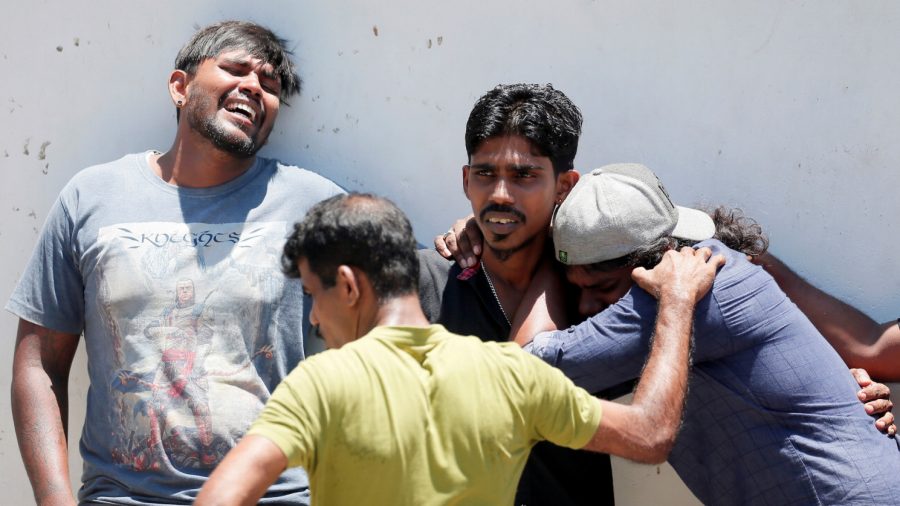COLOMBO—Seven suicide bombers took part in the devastating attacks on churches and luxury hotels in Sri Lanka that killed 290 people and wounded more than 500, a senior investigator said on April 22.
Two of the suicide bombers blew themselves up at the luxury Shangri-La Hotel on Colombo’s seafront, said Ariyananda Welianga, a senior official at the government’s forensic division. The others targeted three churches and two other hotels.
A fourth hotel and a house in a suburb of the capital Colombo were also targeted, but it was not immediately known how the attacks were carried out.
“Still the investigations are going on,” Welianga said.
There was no claim of responsibility for the Easter Sunday attacks, which mainly took place during church services or at hotel breakfast buffets.

“Guests who had come for breakfast were lying on the floor, blood all over,” an employee at Kingsbury Hotel, one of those targeted, told Reuters.
“We just picked up everyone, dead or alive and evacuated them.”
Four of the bombs went off at roughly the same time, at 8.45 a.m., with two others coming within 20 minutes. The explosions at the fourth hotel and the house were in the afternoon.
Sri Lankans accounted for the bulk of the dead and wounded although government officials said 32 foreigners were killed, including British, American, Turkish, Indian, Chinese, Danish, Dutch and Portuguese nationals.
President Maithripala Sirisena, who was abroad when the attacks happened, had called a meeting of the National Security Council on Monday, a government source said. Prime Minister Ranil Wickremesinghe would attend the meeting, the source said.
The U.S. State Department said in a travel advisory “terrorist groups” were continuing to plot possible attacks in Sri Lanka and targets could included tourist spots, transport hubs, shopping malls, hotels, places of worship, airports and other public areas.

The government announced a curfew in Colombo from 8 p.m. until 4 a.m. A Sunday night curfew was lifted in the morning.
The Sri Lankan military, who were clearing the route from Colombo airport late on Sunday in preparation for Sirisena’s return, found a crude bomb near the departure gate, an air force spokesman said.
They destroyed the device in a controlled explosion.
There were fears the attacks could spark a renewal of communal violence, with police also reporting late on Sunday there had been a petrol bomb attack on a mosque in the northwest and arson attacks on two shops owned by Muslims in the west.

Buddhist-majority Sri Lanka was at war for decades with ethnic minority Tamil separatists but violence had largely ended since the government victory in the civil war, 10 years ago.
Sri Lanka’s 22 million people include Christian, Muslim and Hindu minority populations.
The explosion at the house in the Colombo suburb occurred when security forces raided a house there on Sunday afternoon, several hours after the attack. Police reported an explosion at the house and said three officers were killed.
Police said on Monday 24 people had been arrested, all of whom were Sri Lankan.

Social Media Blocked
Traffic was uncharacteristically thin in normally bustling Colombo after the island-wide curfew was lifted.
Soldiers with automatic weapons stood guard outside major hotels and the World Trade Centre in the business district, where the four hotels were targeted, a Reuters witness said.
Scores of people who were stranded overnight at the main airport began making their way home as restrictions were lifted.
The government also blocked access to social media and messaging sites, including Facebook and WhatsApp, making information hard to gather.
A British mother and son eating breakfast at the luxury Shangri-La hotel were among those killed, British media reported.
An Australian survivor, identified only as Sam, told Australia’s 3AW radio the hotel was a scene of “absolute carnage”.

He said he and a travel partner were also having breakfast at the Shangri-La when two blasts went off. He said he had seen two men wearing backpacks seconds before the blasts.
“There were people screaming and dead bodies all around,” he said. “Kids crying, kids on the ground, I don’t know if they were dead or not, just crazy.”
There were similar scenes of carnage at two churches in or near Colombo, and a third church in the northeast town of Batticaloa, where worshippers had gathered for Easter Sunday services. Pictures from the scene showed bodies on the ground and blood-spattered pews and statues.
Dozens were killed in one of the blasts at the Gothic-style St. Sebastian church in Katuwapitiya, north of Colombo. Police said they suspected that blast was a suicide attack.
Domestic Feud
Wickremesinghe acknowledged on Sunday that the government had some prior information about possible attacks on churches involving a little-known Islamist group but said ministers had not been told.
The apparent lapse could feed into a feud between the prime minister and the president.
Sirisena fired the premier last year and installed opposition strongman Mahinda Rajapaksa in his stead. Weeks later, he was forced to re-instate Wickremesinghe because of pressure from the Supreme Court but their relationship is still fraught as a presidential election nears.
By Sanjeev Miglani

